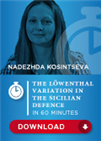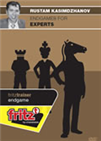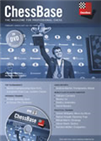A solver and a teacher
The 10th edition of the ARVES study solving competition was held last Saturday (January 26th) at the Hotel Zeecroft in Wijk aan Zee. Fourteen solvers were to work on nine original (unpublished) studies in three hours. Due to the absence of GM Twan Burg — the winner of the last three editions — the battle was open, with no clear favourite.
The eventual surprising winner was former Dutch over-the-board ladies' champion Anne Haast — the youngest participant in the field — who scored 33 out of the maximal 45 points in a superb debut. She left behind three experienced solvers who scored 29 points each — former champion Wouter van Rijn got the second prize, using 173 minutes thinking time, while Willem van Briemen and Martin van Essen shared the third prize with the same score (they used all 180 minutes allotted to solve the studies).

From L to R: Martin van Essen, Willem van Briemen and Wouter van Rijn | Photo: Harry Gielen
Tourney sponsor was Jurgen Stigter, ARVES former chairman and a world famous collector of chess literature, who himself took part in the contest and awarded the prizes to the winners. Chief arbiter was Luc Palmans from Belgium.
Composers of the challenges presented for solving were Martin Minski (Germany), Ladislav Tarasyuk (Ukraine), Steffen Nielsen (Denmark), Jan Timman and Yochanan Afek (Netherlands). The latter was also the tournament organiser.
The surprising winner, a teacher by profession from Tilburg, is now in the midst of respectable company, as some past winners include GMs John Nunn, Twan Burg and David Klein. Anne had to miss the official prize giving in favour of attending a meeting of the Chess Queens, a forum organised by the top female players from the Netherlands.
Nonetheless, we coincidentally met them later and improvised a special street prize-giving celebration for Anne — her fellow queens applauded the achievement enthusiastically.
 In this 60 minutes video GM Nadezhda Kosintseva offers White a repertoire to counter the Löwenthal Variation.
In this 60 minutes video GM Nadezhda Kosintseva offers White a repertoire to counter the Löwenthal Variation.
A teacher by profession, Anne Haast | Photo: Harry Gielen
The reader may try out cracking a couple of tasty nuts from the contest:
Solutions
Final standings
 If you want to play successful chess you must pay great attention to the endgame. On this DVD, Rustam Kasimdzhanov analyses the type of practical endgames which tournament players encounter on a daily basis. He explains what has to be known in order to make the correct strategic decisions and to find the correct plan in such endings. Kasimdzhanov’s outstanding and easily understandable explanations will certainly help you to substantially improve your own performance in the endgame.
If you want to play successful chess you must pay great attention to the endgame. On this DVD, Rustam Kasimdzhanov analyses the type of practical endgames which tournament players encounter on a daily basis. He explains what has to be known in order to make the correct strategic decisions and to find the correct plan in such endings. Kasimdzhanov’s outstanding and easily understandable explanations will certainly help you to substantially improve your own performance in the endgame.
| |
Name |
Country |
Points |
Time |
| 1 |
Haast, Anne |
NED |
33 |
180 |
| 2 |
van Rijn, Wouter |
NED |
29 |
173 |
| 3 |
van Briemen, Willem |
NED |
29 |
180 |
| 4 |
van Essen, Martin |
NED |
29 |
180 |
| 5 |
de Jong, Migchiel |
NED |
27 |
177 |
| 6 |
Baljé, Jan |
NED |
26 |
174 |
| 7 |
Uitenbroek, Hans |
NED |
24 |
180 |
| 8 |
Peelen, Piet |
NED |
23 |
176 |
| 9 |
van der Heijden, Harold |
NED |
21 |
180 |
| 10 |
Stigter, Jurgen |
NED |
20 |
178 |
| 11 |
Bank, Harm |
NED |
16 |
180 |
| 12 |
Van Herck, Marcel |
BEL |
15 |
180 |
| 13 |
Wissmann, Dolf |
NED |
11 |
180 |
| 14 |
Stam, Bart |
NED |
3 |
180 |
A worldwide contest
Chess composition has been adopted by the world's most famous tournaments during the last two decades, albeit in recent years, unfortunately, it tends not to be part of the official program anymore.
The last day of the Wijk aan Zee festival, the Dutch branch of the ISC (International Solving Competition) traditionally takes place. This event transpires at the very same time with the very same problems and studies in 49 parallel tournaments held in 33 countries worldwide — six hundred solvers participate.
The strongest branch this year was held in Fujairah — it was a first for the Emirate — with a number of world-class solvers competing for a generous prize-fund. The overall winner was seven-time world champion Polish GM Piotr Murdzia, who finished ahead of three-time world champion British GM John Nunn and French GM Michel Caillaud.
 Enjoy the best moments of recent top tournaments (WCh Carlsen-Karjakin, European Club Cup and London Classic) with analysis of top players. In addition you'll get lots of training material. For example 11 new suggestions for your opening repertoire.
Enjoy the best moments of recent top tournaments (WCh Carlsen-Karjakin, European Club Cup and London Classic) with analysis of top players. In addition you'll get lots of training material. For example 11 new suggestions for your opening repertoire.
The International Solving Competition | Photo: Harry Gielen
 Solving studies on a regular basis has become more and more popular among over-the-board players as a highly effective — and enjoyable — training method to improve creativity and out-of-the-box thinking. It also sharpens calculating skills and deepens endgame understanding.
Solving studies on a regular basis has become more and more popular among over-the-board players as a highly effective — and enjoyable — training method to improve creativity and out-of-the-box thinking. It also sharpens calculating skills and deepens endgame understanding.
Your author introduced his new book "Practical Chess Beauty" (Quality Chess 2018) in Wijk aan Zee. The book presents my own experiences and creations and has been warmly welcomed by players of all levels.
ARVES (Amsterdam1988) is an international association promoting the art of the endgame study among chess players. It publishes the quarterly magazine “EG” and runs a large and rich website.
Links
























